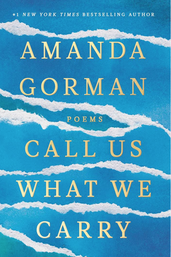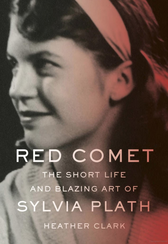WEDS: A Writer's Wit | Junichiro Tanizaki
THURS: A Writer's Wit | Robyn Carr
FRI: My Book World | Bill Moyers, Moyers on America: A Journalist and His Times
|
Up Next:
WEDS: A Writer's Wit | Junichiro Tanizaki THURS: A Writer's Wit | Robyn Carr FRI: My Book World | Bill Moyers, Moyers on America: A Journalist and His Times
0 Comments
Coming Next:
WEDS: A Writer's Wit | Margaret Mitchell THURS: A Writer's Wit | Ivan Turgenev FRI: My Book World | Julia Alvarez, How the García Girls Lost Their Accents
Coming Next:
THURS: A Writer's Wit | Frank Lloyd Wright FRI: My Book World | Gabor and Guttenberg, American Carnage: Shattering the Myths That Fuel Gun Violence (School Safety, Violence in Society)
My Book World Gorman, Amanda. Call Us What We Carry: Poems. New York: Viking, 2021. This collection of poetry may be the most innovative one I’ve ever read—quite fitting for one of our youngest and most distinguished poets. Gorman uses a wide variety of poetic forms. Concrete poetry portrays Melville’s whale, and a poem about the Covid Pandemic is a black mask with white print. She devises a series of free forms fitting the subject matter. Yet others are truly novel, for example, in “The Soldiers (or Plummer),” in which her lines representing a young soldier’s diary appear as dated diary pages. The poet seems to be telling the broad sweep of African-American history by searching out every appropriate form and by sweeping out every ignored corner of said history. One reading, as with most fine poetry, will not be enough. And I look forward to Gorman’s next collection. TUES: A Writer's Wit | Margaret Wise Brown WEDS: A Writer's Wit | Elsa Maxwell THURS: A Writer's Wit | Bennett Cerf FRI: My Book World | Denis Johnson, Angels
Coming Next:
FRI: My Book World | Richard V. Reeves, Of Boys and Men TUES: A Writer's Wit | Margaret Hill McCarter WEDS: A Writer's Wit | Reza Aslan THURS: A Writer's Wit | Henryk Sienkiewicz
Coming Next:
WEDS: A Writer's Wit | Aleksandr Ostrovsky THURS: A Writer's Wit | Eudora Welty FRI: My Book World | Scott Heim: Mysterious Skin
WEDS: A Writer's Wit | Nicholas Monsarrat
THURS: A Writer's Wit | Kim Stanley Robinson FRI: My Book World | Dedman/Clark's Empty Mansions
Coming Next:
THURS: A Writer's Wit | Matt Taibbi FRI: My Book World | Jhumpa Lahiri's Unaccustomed Earth
Coming Next:
THURS: A Writer's Wit | Brendan Behan FRI: My Book World | Reynolds Price's Ardent Spirits
My Book WorldWagner, Sara Moore. Swan Wife. San Diego: Cider Press, 2022.
These may be some of the most exciting poems, the most developed poems I’ve read by a contemporary poet in a long time. Wagner’s structure is deliberate, appropriating certain aspects from Joseph Campbell studies to frame her collection. Sure of her technique and subject matter, Wagner ensures her poems pop with energy: they possess a natural, almost childlike quality in their enthusiasm about youthful love, marriage, having that first child. In “Licentious,” my favorite passage may be: She tells me come out, someone might see me, the bounce of my breasts, this ache. I will have to marry the snake slivering into the banks, will have to marry the sun, a thick hand on my shoulders (xi). Wagner’s title may well spring from “Ball and Chain,” the moment the persona emotionally becomes the betrothed, the soon-to-be swan wife: I dipped my toes in and you called me swan, you said you’ll go where you want. It was maybe then I knew you saw me, how I wanted to fly or float, to cover. How even a mute swan will hiss and attack if you get too close. How you called me beautiful then, so beautiful and so loud, the say I’d hoot up to the stars, the way I showed my teeth (7). The poet’s persona maintains her controlled ebullience throughout the entire collection, and I hope to read more of Wagner’s work. Congratulations to her for winning the 2021 Cider Press Review Editors’ Prize Book Award. The collection is quite deserving. Coming Next: TUES 12/06: A Writer's Wit | Ève Curie WEDS 12/07: A Writer's Wit | Noam Chomsky THURS 12/08: A Writer's Wit | John Banville FRI 12/09: My Book World | Edith Wharton's The Custom of the Country
My Book World Clark, Heather. Red Comet: The Short Life and Blazing Art of Sylvia Plath. New York: Knopf, 2020. This impressive biography of the famed poet may be the most comprehensive literary biography I’ve ever read. Clark, who took more than ten years to write this book, utilizes a broad range of sources, including Sylvia Plath’s diaries, letters (some never before seen), journals, and poems. Clark also includes the story of Plath’s famous poet husband, Ted Hughes. It would be like telling the story of one conjoined twin without including the other; that is how inextricably woven their lives are, right up to Plath’s infamous suicide, in 1963. The acknowledgement page and Clark’s notes section are filled with other sources, she having visited England to conduct research as well as interviews, and having combed U.S. libraries from coast to coast. The book reads more like a novel, achieving a fiction-like narrative arc. We learn of Plath’s early childhood, the loss of her father, her dominating but generous mother. We learn of Plath’s education, particularly her four years at the prestigious Smith College. We learn of her creepy attempt at suicide, almost succeeding, when her near-dead body is discovered in a crawl space beneath the family home, her electroshock therapy at a draconian institution in Massachusetts. We cross the Atlantic where Plath continues her education at Cambridge University, where she meets her match intellectually as well as future husband, Ted Hughes. This narrative continues to build as we learn of her struggle to cope with a male dominated literary life in London. She is alternately elated and deflated as some of her work is accepted with accolades and “her best work” rejected by the likes of the New Yorker as well as prestigious English journals. It would have been a mistake for her to eschew her British education because the Brits seem, at times, more open to her raw style than the Americans. We live through the Plath-Hughes tempestuous marriage and become acquainted with their two children. Plath’s death comes with fifty pages to go. It is the climax, all right, but it is not the end of Plath’s story. All throughout the biography Clark intersperses lines from Plath’s and Hughes’s work to demonstrate not only biographical elements but fascinating literary observations, as well. But even Plath’s death is deconstructed in such a way that we may understand it differently from earlier biographies (Anne Stevenson’s “famously negative” one, for example). With twenty-twenty hindsight, we see that Plath’s suicide (as many are) is mere minutes away from being another failed attempt. Plath is always, in the damp English climate and because she runs herself ragged, having bouts of a cold or the flu. As a result she takes a number of OTC medications, as well as a merry-go-round of prescription drugs, including antidepressants, sedatives to sleep, other drugs to wake her up so she can work—all of these interacting horribly as a perfect storm to help end her life (some experts understand that those particular antidepressants may have intensified her depression before finally kicking in). And it isn’t as if she doesn’t try to live. She consults doctors and psychiatrists galore. She corresponds with an American psychiatrist across the Atlantic. She fights like hell to stay out of British psychiatric wards because she is terrified she will be subject to shock therapy again, which she believes, has altered her brain and her life forever. For fans or nonfans alike this biography is a must-read. It generously takes all we knew about Plath before, all the research that has come earlier, and adds or even convincingly contradicts a great deal of the old. I can’t see any biographer attempting to top it for a long time to come. Indeed, the book may finally put her story to rest alongside her grave atop a lonely spot near where her husband grew up at Heptonstall—a simple granite marker worn down now by nearly sixty years of inclement weather. Coming Next: TUES: AWW | Mary Shelley WEDS: AWW | Eldridge Cleaver THURS: AWW | Jesse Kellerman FRI: My Book World | Colin Barrett's Homesickness: Stories
My Book WorldSparks, Muriel. The Prime of Miss Jean Brodie. New York: HarperPerennial, 1999 (1961).
If one has seen only the movie version of this book, a fine work in its own right that premiered in 1969 with the inimitable Maggie Smith starring in the main role, one might be lulled into thinking the book to be quite similar. One would be wrong. This short novel set in 1930s Edinburgh, Scotland, impresses me as being an extended prose poem about an intelligent and nonconformist teacher who is yet rather naïve. Brodie eschews the prescribed school curriculum to lecture her female pupils concerning a wide variety of cultural and artistic topics, and yet when she also embraces the likes of fascist leaders such as Mussolini and Hitler, she reflects either a certain naivete or an intellectual dullness. The word “prime” or phrases containing that word appears more than thirty times throughout these brief pages; the phrase “crème de la crème” more than five. Both have a rather fatuous ring to them, “prime” referencing Miss Brodie’s heightened sense of her own refinement and knowledge, and “crème de la crème” indicating the girls she has rather commandeered to follow her—not just for the year they are in her class but for their entire lifetimes: they are the “Brodie set.” Spark’s structure is an omnisciently meandering one in which she may speak of one child in her adult future, one dying prematurely, another becoming a nun. Very lightly Sparks inserts that the year is 1931 or 1937 or that Ms. Brodie is now forty-three. One knows where one is at all times as if the novel were a sort of hologram. Young Sandy is the only pupil who sees through Jean Brodie’s ways, and early on readers learn that she will bring Brodie down. In the last scene of the film, a wounded Brodie who has been released from her teaching position because of Sandy’s actions screams the word “Assassin!” after her beloved Sandy, but the book ends rather quietly when readers visit Sandy upon her adult position in a nunnery. When asked about her childhood influences, she simply says, “There was a Miss Jean Brodie in her prime” (137). Coming Next: TUES: AWW | Erin Foster WEDS: AWW | Howard Zinn THURS: AWW | Nadine Stair FRI: My Book World | Heather Clark's Red Comet: The Short Life and Blazing Career of Sylvia Plath
WEDS: AWW | Herta Müller
THURS: AWW | Nicole Krauss FRI: My Book World | Muriel Sparks's The Prime of Miss Jean Brodie
Coming Next:
WEDS: AWW | Suzanne Collins THURS: AWW | Alex Haley FRI: My Book World |Douglas Stuart's Young Mungo
FRIDAY: My Book World | Nancy Turner's These Is My Words
FRIDAY: My Book World | Henry James's The American
TOMORROW: My Book World | Cara Robertson's The Trial of Lizzie Borden
FRIDAY: My Book World | Hilma Wolitzer's Today a Woman Went Mad in the Supermarket: Stories
My Book World Neruda, Pablo. Residence on Earth. With an introduction by Jim Harrison. Translated by Donald D. Walsh. New York: New Directions, 2004. The translator for this collection, Donald Walsh, in his Translator’s Note, sites critic Amado Alonso who declares: “‘Instead of the traditional procedure, which describes a reality and suggests its poetic sense between the lines, poets like Neruda describe the poetic sense and nebulously suggest to which reality it refers’” (363). Amen. Instead of moving from the concrete to the abstract or allowing metaphors to emanate from the specific, Neruda seems to dwell, in the bulk of his work, on abstractions or impressionistic articulation of ideas, and one can tend to tune out. However, of course, a number of his poems do catch hold of me for their perceptions of human nature, of the nature of power, particularly political power in mostly Spanish-speaking nations. I particularly admired “Burial in the East,” “Single Gentleman,” and “Ode to Federico Garcia Lorca.” “General Franco in Hell” arrested my attention with its quickly shifting imagery, emphasizing in its closure the utter contempt and hatred for fascist, Franco. All in all, not my cup of spiced tea, but I feel better for having read perhaps Neruda’s most notable collection. NEXT FRIDAY: My Book World | TBD
FRIDAY: My Book World | Frank Lloyd Wright's An Autobiography
FRIDAY: My Book World | Benjamin Dreyer: Dreyer's English: An Utterly Correct Guide to Clarity and Style
FRIDAY: My Book World | Fiona Hill's Mr. Putin
TOMORROW: My Book World | E. M. Forster's The Life to Come and Other Stories
FRIDAY: My Book World | E. M. Forster's A Life to Come and Other Short Stories
|
AUTHOR
Richard Jespers is a writer living in Lubbock, Texas, USA. See my profile at Author Central:
http://amazon.com/author/rjespers Archives
June 2024
Categories
All
Blogroll
Websites
|